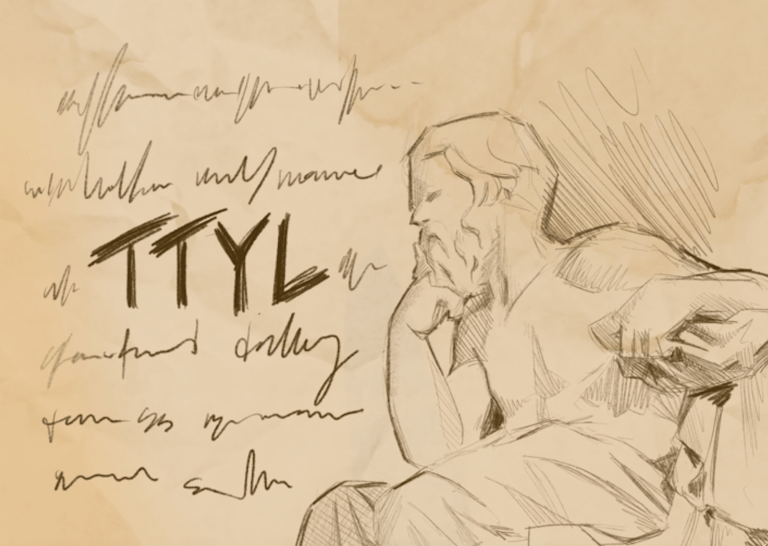In her bi-weekly column, Text to your life (TTYL), Sonnet Xu examines classics from years past that are timely in their messages to this day. Maybe the classics still have something to say.
Throughout my time in SLE, I’ve had to encounter and engage with many texts and authors that I’ve heard of, but never deeply explored, ranging from Marx to the Bible. Some of the books are dated, some of them are boring and some of them are hard to understand, to process or to agree with. But as my time at Stanford has continued, I’ve increasingly come to recognize their value. Without being able to gain some foundational knowledge about the beginnings and evolution of Western tradition, I don’t think I would have been able to appreciate a moment in the Humanities Research Intensive, where I was guided by Professor Emanuele Luigi through the deconstruction of a “scientific” map, and recognized how many of the “objective” structures around us were arbitrarily engineered by some dominant human or group of people long, long ago.
While I reflect on this as my freshman year comes to a close, I’ve realized that opening myself to these opportunities has really changed me as a person. By staying within the obligatory processing of classics in high school and deprioritizing the humanities in my past, I’d been willingly giving up the experiences, arguments and insights built from the centuries before me. Unconsciously, I was subscribing to a plethora of norms and values that had been developed for me by someone else.
Thinking about this brought me back to the dystopian world of “The Giver,” a piece I read in elementary school. “The Giver” by Lois Lowry follows Jonas, a young boy living in a seemingly perfect, controlled community devoid of pain and suffering. As he is chosen to inherit the position of Receiver of Memories, Jonas uncovers the dark truths behind his society’s superficial utopia, experiencing emotions and memories that lead him to question and ultimately rebel against the community’s rigid constraints.
His journey begins with happy memories, like the exhilarating joy of sledding down a snowy hill, leading him to question why the community withholds such experiences from the general population. As he delves deeper, Jonas encounters harrowing memories of war, suffering and death, experiencing the associated pain but also gaining profound wisdom and insight into the true nature of his society.
In a similar fashion, studying the humanities is valuable because it allows us to explore the full spectrum of the human experience, in all its varying shades, degrees and perspectives. While we might begin reading fun pieces and experiencing the ups and down of stories such as “Oliver Twist” or “Little Women,” studying the humanities is a gateway towards rigorous societal evaluation, criticism and evaluation. Through this process, we gain insight into how traditions, practices and systems have been conceived, integrated and transformed over time. This deeper understanding helps us appreciate the complexities of our world, much like Jonas’s journey helps him see beyond the superficial perfection of his community. Reading and learning from those before us gives us a glimpse of some of their most treasured “memories” and ideas, helping us develop a more informed view of society.
Like “The Giver” illustrates, opting to give up knowledge can have dramatic consequences on the way society functions. In the novel, the community’s reliance on the Giver for guidance in navigating new scenarios highlights their inability to think independently and critically. Without access to the collective memories and experiences that the Giver holds, the community members are ill-equipped to handle unforeseen challenges, demonstrating a dangerous dependency on a single source of wisdom. Similarly, in our own society, while we may appear to have the freedom to think independently, we often find ourselves constrained by the limited perspectives we have been exposed to through our systematic upbringing and education. When truly novel conflicts arise, our initial responses are typically shaped by these ingrained viewpoints, until a visionary introduces a disruptive idea that broadens our understanding and paves the way for alternative ways of thinking. For example, Beauvoir and modern feminism. This underscores the importance of embracing diverse perspectives and the continuous pursuit of knowledge, as it empowers individuals and societies to adapt, grow and thrive in the face of new challenges.
By failing to think critically, we are drifting towards homogeneity and passivity, increasingly accepting others’ ideas as facts and reducing ourselves to mere pieces in a larger system.
Looking at contemporary issues like political polarization, internet misinformation and fake news, many of these problems stem from people’s tendency to outsource their thinking to external authorities such as governments, political parties and internet influencers. This reliance leads individuals to accept biased or misleading information without critical examination, exacerbating divisions within society. For example, the spread of conspiracy theories on social media often capitalizes on this lack of independent thought, with users uncritically sharing content that aligns with their preexisting beliefs. Similarly, political polarization is fueled by echo chambers where people are exposed only to information that reinforces their views, further entrenching divisions and reducing opportunities for meaningful dialogue and understanding.
In the last chapter of “The Giver,” Jonas leaves his community, compelling them to confront the complexities of emotions and feelings on their own. This departure leaves us with a poignant question: what about us? Our collective memories and wisdom lie dormant in the books and stories we often neglect. By engaging with these rich and often painful sources of knowledge, we can better understand ourselves and the world, fostering a society capable of critical thought, empathy and resilient understanding.
